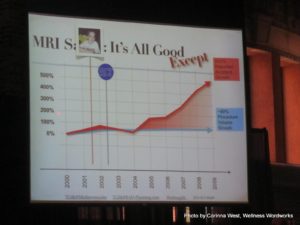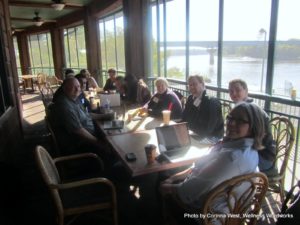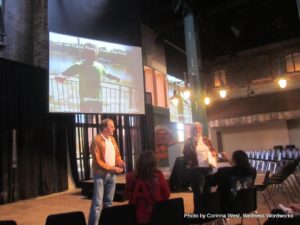1. We need to unite with other health care improvement advocates. I got an email last Thursday Morning from a Mad In America reader that said, “I’m a mental health consumer who’s still coming to grips with if I can actually make a difference which is why I admire your work. I’ve gotten very involved with the Society for Participatory Medicine and one of the leaders, Regina Holliday, who is an arts activist after some very negative experiences in the health care system is organizing a conference run by consumers. I think you would get a lot out of meeting her. She paints jackets with people’s healthcare stories on the back and to my knowledge there have been none from mental health yet. And mental health stories definitely should be told at this conference which is actually in Kansas City. She managed to get it funded through Medstartr. Keep speaking your truth…” So I showed up at the conference.

One thing to point out is that although most mental health advocates hate the word “patient,” for various reasons based on psychiatric oppression, it’s fairly non offensive to most people with other health challenges, so as we connect our two movements, maybe we can come up with a compromise term.
2. We can make money doing this. Many people at the conference were “professional patient advocates.” There are universities that give degrees or certifications in health care advocacy, online listings for people to find advocates as needed, people who work in hospitals for advocacy, and http://speakerlink.org/ where you can list your profile if you want paid engagements at medical conferences helping providers figure out what’s really happening.
3. Time to get more mental health folks on Twitter. Many of the people at this conference used Twitter as a great tool for engagement. You should, too. Here are the objections I’ve heard to joining Twitter and the truth according to @CorinnaWest.
- Twitter is just people talking about trivia and nonsense – It’s more like a personalized magazine. It’s a link sharing service where people say, “Here’s an article you’ll enjoy.” Plus people doing live reporting of events you wish you could have attended.
- Twitter is hard – It’s very simple, much easier to learn than Facebook. For older people or other technophobes, I’d actually recommend Twitter over Facebook for the amount of time it takes to learn.
- I don’t have time for social media – You don’t have NOT to use social media. I only have about ten local friends who don’t text, email, or use Facebook, and unfortunately those people are getting invited to less and less events, because the invites I make to those 10 people take as long as the invites to the 600 others.
To get started, just go Twitter.com and sign up for an account. Google, “How to get Twitter followers,” and “Basic Twitter etiquette,” and that’s about all you’ll need to know right away. Follow me at @CorinnaWest, @PeerWordworks, @UnDiagnosing, @C0nnectP0wer, @PoetryforPower, OR @CombatArtsKC.

The conference hashtag, #cinderblocks (I didn’t understand the symbology) got over 2 million views during the conference. You can check the entire transcript of the conference here on Symplur. Like David Oaks says, we are our own media. Let’s make Alternatives a social media friendly conference this year. I’ve registered #Alt12 as our conference hashtag… now start some buzz.
4. Have a good conference networking system. My system is to ask everyone at the conference to buy something from me and whether they say yes or no, to ask them to sign up for my email list on a clipboard I have. This gives me a good chance to explain what I’m about and then I make sure I ask them what they’re working on and put a note on the sign-in sheet so I remember. I use the back of the sheets for conference info. I find this works well because many events I’m at, people don’t have business cards. Also, to find a business card in my Rolodex I have to remember a person’s name, but to find them on the sign-in sheet I just have to remember what event it was. Every single person I met at this conference was brand new to me, and I’ve got good at remembering faces, so I need some kind of written system.

5. Allow serendipity to happen – Because I heard about this conference the day before it was happening, I already had my weekend totally booked. My friends and I were doing The Trashboat Regatta, floating the down the Missouri River on homemade boats for under $100 pulled by bicycle to and from the river. My boat was based on a hot tub lid. As we launched, Dave Cornthwaite swam in. He is a professional adventurer swimming 1000 miles down the Missouri River to raise money for breast cancer. I didn’t get to talk to him because our boat was already launched and we had navigational problems (later we went through the sewage outlet whitewater rapids.) But I got on his Facebook page and asked him to stop by our conference (which was on the river) the next day and he did!
It turned out that many of the advocates were cancer survivors and he was doing a series of 25 1000 mile adventures and he agreed to walk 1000 miles in one of Regina Holliday’s patient story jackets. Everyone was very excited to meet someone doing something incredible like that and he got some food and water provisions stocked up from our conference extras and the busy Twitter people at the conference sent Dave’s story and pics and 5-minute speech nationwide. I overheard someone ask Regina, the conference organizer, if she minded the conference being delayed by this and she said, “No, this is win-win for both of us.”
Here is Dave’s challenge to have an adventure every day with a huge surprise for a 1000 mile swimmer:















Dang, Corinna, you are a force of nature! I think you have some of the best ideas on MIA. I believe in you. I think it helps me to believe in myself… Thank you.
Your admirer,
Emily
Report comment
She is a force of nature, very inspiring. Very inspiring indeed. And the Judo thing, just a killer hook. A wonderful presence here on this site.
“One thing to point out is that although most mental health advocates hate the word “patient,” for various reasons based on psychiatric oppression, it’s fairly non offensive to most people with other health challenges, so as we connect our two movements, maybe we can come up with a compromise term.”
Well… inescapably true. About as inescapable as a locked ward, true.
People forced into psychiatry are people who’ve been forced into a “patient” relationship they didn’t want. Like a forced marriage or slavery. We also have to sit powerless while the “patient” term is used to justify what is done TO us, not for us.
I admire anyone with the patience to do what Corrina is doing.
Report comment
To me, the questions run a little deeper: is it about patient rights, or human rights? Does the health system, the so-called mental health system (it’s really the mental illness system, isn’t it) included, need to change, or the culture that medicalizes emotional distress?
Well, I know what my answers to these questions are, and I won’t compromise on them. While it may be fine as far as real health problems are concerned, “participatory” is nowhere near what I think I’m entitled to when it comes to existential matters.
Report comment